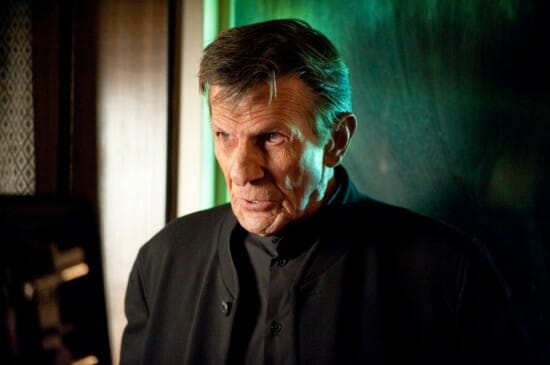Fringe: “Brave New World Part 2” (Episode 4.22)

“To us it almost looks like magic. It’s not though. It’s just tech.” -Jessica Holt
Let’s get one thing clear off the bat: this was a very good episode of Fringe. The problem, of course, is that this is the second half of a two-part finale, the first half of which was shockingly mediocre (if not outright bad). The larger question is what sum we arrive at when combining the two, and where does that leave the series with 13 hours remaining?
Let’s start with the positives. The death and life of Olivia Dunham scene was excellent and was something only Fringe could have delivered. The promotion of General Broyles was a nice touch (especially with the Raiders of the Lost Ark undertones). Leonard Nimoy is considerably less hammy this week, and he and John Noble have some great moments together that really bring the character of Walter full circle.
Except that this isn’t Walter—at least not the Walter whose memories and experiences we’re familiar with, and there’s the problem. The season-long experiment with a new timeline has produced some wonderful moments, but frankly there was a lot of time wasted on throwaway storylines that could have been spent re-establishing some kind of connection to the characters that we spent so much time with. Having Olivia get her old memories back was great, but the other characters would have benefitted from something similar, particularly if this episode was the planned endgame.
Without some kind of new connection, then this is not the William Bell I want to see defeated nor the Walter I truly care about. They are proxies, always a step removed from the story I was hoping for. They are echoes, and while admittedly an important part of the show’s mythos, they are disappointingly ineffective here.
Take the repeated revelation that Bell cut out part of Walter’s brain at Walter’s request. This is information we already knew and an altered version of a scene we’ve seen before. While it does offer some illumination on what sort of men these two are in contrast to their predecessors, the end result is identical; Walter brought about his own lobotomy due to fear over what he was capable of. The root of that fear may have shifted along with the fine details, but the overarching issue is the same and frankly it’s no more interesting than it was the first time.
This goes back to my long-running complaint that despite many, many fantastical elements, the creative team has never fully embraced the possibilities that their genre provides them. I fully recognize how bizarre that sounds in regard to a show that regularly uses time travel, alternate universes and superpowers as stock plot elements, but the simple fact is that time and again, the show has walked itself to the edge of legendary lunacy but has always backed down rather than taking the leap.
Don’t believe me? Where did all that talk about “The First People” (or the TFP) and how Walter somehow traveled back to the beginning of time and scattered the doomsday machine around the planet for his future self to find wrap up? Then do you remember the tangent storyline about how there was a cult that spawned from the TFP and how they had a manifesto that Walter may have written pre-lobotomy and how David Robert Jones may have been their leader? Even if you remember everything I’m talking about, it doesn’t matter. Because rather than paying off those admittedly interesting threads, the creative team jettisoned all those ideas when they deleted the original storyline. I guess that’s one way to get out of a corner you’ve written yourself into, but it certainly would have been more interesting to try and actually get out of the corner rather than simply saying ‘we’re still in a corner, but it isn’t the same corner you remember.’
-

-

-

-

-

-

-

-

-

-

-

-

-

-

-

-

-

-

-

-

-

-

-

-

-

-

-

-

-

-

-

-

-

-

-

-

-

-

-

-








































